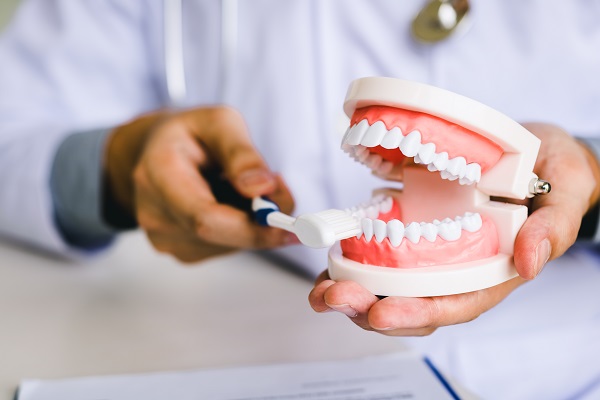Why Proper Dental Hygiene Is Crucial After Dental Implant Surgery

Most people dream of keeping their own healthy teeth for life, but for those who cannot, a dental implant may be the answer. Cavities or infection can take a toll on otherwise strong teeth, and so can accidental impact or breakage. Even a crown may weaken or crack.
Dental implants are giving hope to many who otherwise may be resigned to wearing dentures.
Who is a candidate for a dental implant?
There are just a few crucial criteria that give implants a better chance of being successful. Perhaps most importantly, the jaw must have adequate bone density and depth to support the titanium roots that go below the gums. A mild infection can be treated, but those with periodontal disease are not candidates. Additionally, the general health of the person will be evaluated.
People without heart problems or other issues that would prove dangerous during the process of oral surgery are good candidates for one or more implants.
What is involved in the implant process?
After determining whether someone is a good risk, any teeth that need to be removed are taken care of. Then an incision is made in the gum line and a titanium implant is screwed into the bone itself, replacing the root. A protective covering is put in place while the gums heal.
Next, a series of things happen. The gum is uncovered and an impression of the area and any surrounding teeth is taken. Then a working model is made and tweaked until the fit is accurate. Finally, the crown is seated on the implant.
Proper aftercare
After what can take a couple of months, the implant process is complete, but what comes next is crucial to its success. Maintaining oral health and the integrity of a new dental implant takes a bit of work. Food particles may stick to an artificial material even more than natural teeth, so there are several measures that need to be taken in order to keep the mouth healthy.
Brushing
Brush regularly, at least twice each day, using a non-abrasive toothpaste. Brushing is one of the best ways to keep a new implant clean. Choose an electric, sonic or manual toothbrush, but make sure it has soft bristles.
Flossing
Carefully floss around all teeth, paying special attention to the area around the implant. If floss will not go through, don’t force it. Instead, visit the dentist to see if a problem needs to be corrected. A water flosser is also a good option and can be used with a germ-killing mouth rinse for added protection.
Regular checkups
Maintain at least semi-annual visits to the dentist, going more frequently at the first sign of trouble or concern. The dentist will check for any cracking of the implant or signs of bone loss or infection. They will make recommendations as needed to correct any issues.
Conclusion
A dental implant is a big investment both financially and in time. A person’s appearance and oral health can be greatly improved by undergoing the process. But ultimately, getting the most out of them comes down to making a diligent habit of performing good oral hygiene practices.
Are you considering dental implants in the Gainesville area? Get more information at https://gallodental.com.
Check out what others are saying about our services on Yelp: Read our Yelp reviews.
Recent Posts
A full mouth reconstruction restores oral health, functionality, and aesthetics for patients with extensive dental issues. This process combines multiple restorative, cosmetic, and sometimes surgical procedures to address concerns such as missing teeth, decay, gum disease, or bite misalignment. No matter the issue, a full mouth reconstruction is tailored to the individual's unique needs, offering…
A denture reline something that almost all the recipients of dentures will need at some point. A reline is a procedure your dentist does to provide you with a new, more comfortable fit for your dentures.Our mouths are constantly changing throughout our entire life. Your bones shift and move as you get older, and your…
An emergency dentist can provide tooth-saving care in emergency dental situations. However, it is common not to know what constitutes a dental emergency nor how to handle common situations while waiting for dental care. Understanding when to seek help from an emergency dentist and how to manage the situation before you get to their office…
Many people start their search for a local dentist by typing "find a dentist near me" into the search box of their internet browser. However, finding a local dentist who provides high-quality care, feels comfortable, and meets your or your family's dental needs starts with knowing what to look for. Understanding the key features of…


